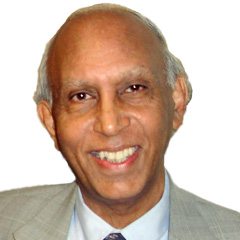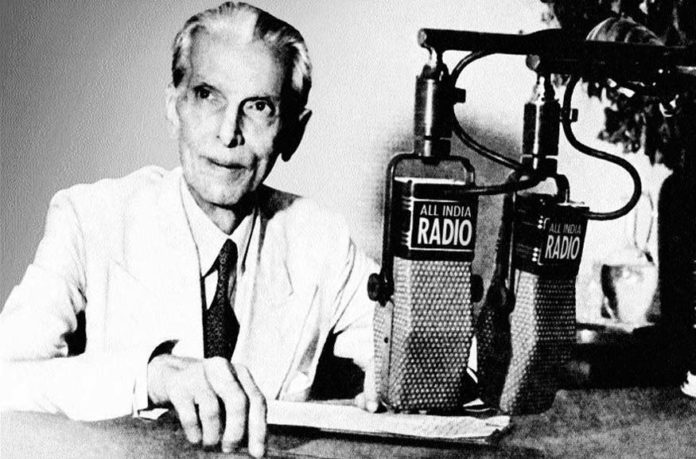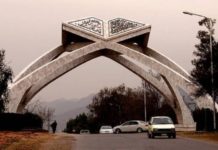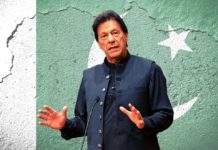I fully understand the concern of a whole range of intellectuals representing an assortment of liberals and leftists who steadfastly and heroically keep writing that Jinnah was a secularist, he wanted Pakistan to be a secular state or at least an inclusive Muslim state. As far as an inclusive Muslim state is concerned they are right to a point, but they are dead wrong when they assert that Jinnah was a secularist or that he wanted Pakistan to be a secular state.
A secularist being defined in terms of a western life style and unorthodox dietary habits is a loose and poor use of the term and concept of secularism. Secularism is a political term which means a separation of religion and state. Except for the 11 August 1947 speech which can reasonably and legitimately be read as one based on secularism there is no such vision or argument in what he said before that day or afterwards that suggests that Hindus and Muslims can be equal citizens of Pakistan. Therefore, one sunny day does not make a summer or more accurately one swallow does not make a summer. In other words, exceptions are not the rule.
I would like to propose an alternative perspective on Jinnah: he enjoyed unique power and authority and thus unique prerogatives. He could make decisions and appointments which other Pakistan leaders would have hesitated to do. The Hindu Dalit Joginder Nath Mandal was appointed law minister because Dr Ambedkar was made India’s law minister. However, whereas Ambedkar became the chairman of the Constitution Drafting Committee and his stamp on that constitution is profound and lasting Mandal was given no such task. After Jinnah Mandal was ignored and finally he resigned. He wrote a letter that Hindus in East Bengal were being persecuted and his community of Dalits was being ignored so he left for India.
Sir Zafrulla enjoyed Jinnah’s trust and in my book, The Punjab Bloodied, Partitioned and Cleansed(Oxford University Press), I have shown that he pleaded Pakistan’s case before the Punjab Boundary Commission with sterling competence. He received compliments from Congress counsel Mr Setalvad for his excellent performance. I have the testimony of Syed Ahmed Saeed Kirmani (Sunni) and Syed Afzal Haider (Shia) that Zafrulla was outstanding.
So, Jinnah made him Pakistan’s foreign minister. May I dare also add that Zafrulla had powerful backing from the British and possibly US administrations. Pakistan was at that time a British Dominion. Later, Khawaja Nazimuddin was reported saying that if he removed Zafrulla the Americans would stop the supply of US aid including food aid which was badly needed. This is reported by Chaudhary Khaliquzzaman in his book, Pathway to Pakistan.
Jinnah was not in favour of a Muslim state which would institutionalise discrimination against minorities. He thought that Pakistan could be an inclusive Muslim state
I can give another example to show that Jinnah’s prerogatives were not without limits, however. During the first Kashmir war Jinnah in October 1947 as Governor-General Jinnah ordered the Pakistan military to intervene in Kashmir directly, but officiating Commander-in-Chief of the Pakistan Army General Gracey refused to comply with his orders (General Messervy the C-in-C was on leave in England). Normally, Gracey should have been court-martialled or at least dismissed. However, the opposite happened: in February 1948 he was instead promoted as C-in-C of the Pakistan Army! The reason must be that such appointments were still being decided from outside Pakistan: by the British I presume. I describe this in my book, Pakistan: The Garrison State (Oxford University Press).
Unlike his call for Pakistan in 1940 which received support from broad sections of society Jinnah’s 11 August speech only created confusion. In the Pakistan myth-making factories it is said that Chaudhri Muhammad Ali and Liaqat Ali Khan conspired to have that speech removed from public discussion. The truth is that till at least June 1948 Jinnah was very much Pakistan’s all-powerful leader who presided over cabinet meetings and made appointments, dismissed elected governments and took many other such decisions. How could his speech be suppressed by his subordinates without his acquiescence? It is an afterthought which our liberal-left has conjured up but without any credibility. The truth is that Jinnah and his associates must have found that speech too radical a departure from the raison d’etre of Pakistan and a decision was taken not to propagate it any more.
Nevertheless, it is perfectly understandable that Jinnah was not in favour of a Muslim state which institutionalises comprehensive discrimination of minorities and he thought that Pakistan could be an inclusive type of Muslim state. The 11 August 1947 speech can be read as a peculiar variation of that same idea: of an inclusive Muslim state.
The truth is that the 1,400 years of Islamic history, theology and law show that whereas scope has existed for religious communities recognised by the Quran as people of the book — Christians, Jews and a nearly-extinct group called Sabians to live in a Muslim state peacefully — no scope exists for religious groups emerging from within the broad Islamic faith which call into question the finality of the prophet hood of Prophet Muhammad (PBUH). In 19th century the Bahai faith emerged in Iran and in the subcontinent Ahmadiyyat. The Bahais broke away from Islam claiming they were not Muslims but a separate religion. Persecution of Bahais in Iran has been even worse than of Ahmadis in Pakistan. Under Khomeini Bahais were killed in very large numbers. In the subcontinent Mirza Ghulam Ahmad claimed to be a prophet receiving revelation from God. The Sunni and Shia reaction followed soon after and the rest of that history is well known.
Now, Jinnah could use his prerogative and appoint Zafrulla as foreign minister but with him that prerogative ended. Zafrulla could survive some years more as foreign minister more, but the majority will finally prevailed and they were declared non-Muslims in 1974. It was no quirk of history: it was inherent in a state based on belief in Islam. Obviously in a united India it would not be possible.
In my next article I shall be arguing that the Objectives Resolution is no betrayal of Jinnah but the correct position of what Pakistan can offer to its minorities.
About the Author:

Dr. Ishtiaq Ahmed is Professor Emeritus of Political Science, Stockholm University; Visiting Professor Government College University and Honorary Senior Fellow, Institute of South Asian Studies, National University of Singapore. He can be reached at billumian@gmail.com








